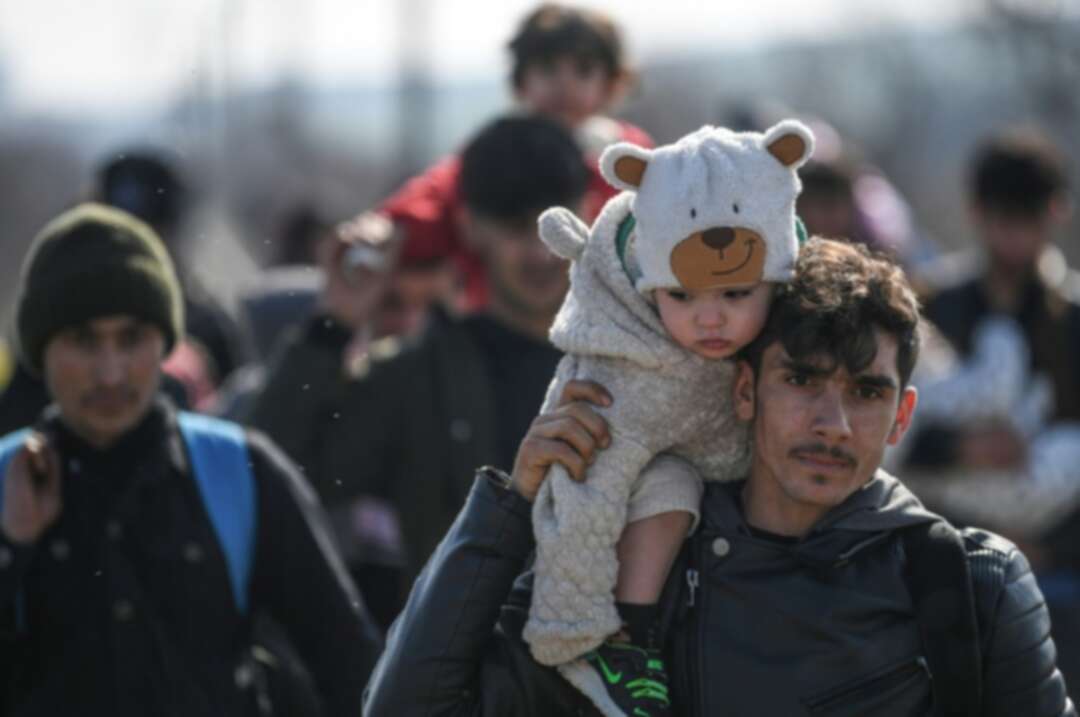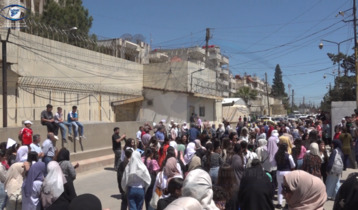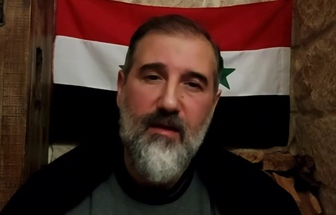-
Greece blocks migrant swell at Turkey border

Greece said Sunday it has blocked nearly 10,000 migrants at its border with Turkey, which opened its gates to Europe as tensions mount over its deepening conflict in Syria.
Migrant numbers have swelled along the rugged frontier after Turkey's President Recep Tayyip Erdogan said it "opened the doors" to Europe in a bid to pressure EU governments over the conflict.
Tensions have soared between Russia and Turkey -- who back opposing forces in the Syrian war -- after an airstrike killed dozens of Turkish soldiers in Idlib last week.
Some 13,000 migrants have amassed at the Turkey-Greece border, including families with young children who spent the night in the cold, the International Organization for Migration said.
An estimated additional 2,000 migrants arrived at the Pazarkule border gate Sunday, including Afghans, Syrians, and Iraqis, according to an AFP reporter.
But as the crowds rushed to enter Europe, Greek police and soldiers blocked 9,972 "illegal entrances" from entering the northeastern Evros region in the past 24 hours, a Greek government source said.
Greek's deputy defense minister said the country would not stand down.
"We are protecting the borders of Greece and Europe with a firm hand", Alkiviadis Stefanis said in an interview in Skai TV on Sunday.
Migrants pressed on with efforts to enter Greece. Some attempted to swim across rivers or duck under fences, while others dragged suitcases as they marched toward the border where large crowds of migrants waited, some wrapped in blankets or sleeping on dirt mounds.
Despite Greece's efforts to repeal the crowds, several boats full of migrants arrived on the Greek island of Lesbos early Sunday, AFP journalists said.
Clashes erupted between police and migrants on Saturday on the Greece-Turkey border, with police firing teargas at refugees who responded by lobbing rocks.
Greek authorities said at least 139 migrants have been arrested since Friday.
The EU's border protection agency Frontex told AFP Sunday it was on "high alert" at Turkey's borders with Europe and that it has "taken steps to redeploy to Greece technical equipment and additional officers."
It had received a request for support from Greece.
European Commission chief Ursula von der Leyen on Saturday said the EU was watching "with concern" and stood ready to deploy its Frontex border guard agency.
The developments recalled events in 2015 when over a million migrants fled to Europe, mainly via Greece in what became the continent's worst refugee crisis since the Second World War.
The EU's commissioner for migration, Margaritis Schinas, tweeted Sunday that he had requested an extraordinary meeting of EU interior ministers to discuss the situation.
Erdogan said Saturday that Turkey, home to some 3.6 million refugees, had opened its borders to Europe and did not plan to close them because "the (EU) should keep its promises".
He was referring to the 2016 deal with Brussels to stop the flow of refugees in exchange for billions of euros.
The latest migrant influx swelled after an escalation of violence in Syria's northern Idlib province, where an airstrike on Thursday left 34 Turkish soldiers dead.
Turkey said Sunday it was "successfully" continuing its military operation against the Russian-backed Syrian regime in Idlib -- but insisted it did not wish to clash with Moscow.
Turkish forces targetted Syrian regime positions over the weekend after Erdogan warned Damascus would "pay a price" for its aggression.
Erdogan urged Russia to move out of the way and "leave us face to face" with Damascus.
Turkey said its forces destroyed a chemical warfare facility south of Aleppo, although Syria's state media denied the attack and the facility's existence.
Turkish drone strikes also killed 26 Syrian soldiers on Saturday, the UK-based Syrian Observatory for Human Rights said.
The latest escalation has raised tensions between Ankara and Damascus-ally Moscow.
The Kremlin said Erdogan and Russian President Vladimir Putin could meet on March 5 or 6, which the Turkish Foreign Minister Mevlut Cavusoglu confirmed on Saturday.
Forces of Syrian President Bashar al-Assad pressed an assault on the last rebel-held bastion of Idlib backed by Moscow airpower, which has killed hundreds of civilians.
Nearly a million people have also been forced to flee their homes in the region in the latest offensive.
source: AFP
You May Also Like
Popular Posts
Caricature
BENEFIT Sponsors BuildHer...
- April 23, 2025
BENEFIT, the Kingdom’s innovator and leading company in Fintech and electronic financial transactions service, has sponsored the BuildHer CityHack 2025 Hackathon, a two-day event spearheaded by the College of Engineering and Technology at the Royal University for Women (RUW).
Aimed at secondary school students, the event brought together a distinguished group of academic professionals and technology experts to mentor and inspire young participants.
More than 100 high school students from across the Kingdom of Bahrain took part in the hackathon, which featured an intensive programme of training workshops and hands-on sessions. These activities were tailored to enhance participants’ critical thinking, collaborative problem-solving, and team-building capabilities, while also encouraging the development of practical and sustainable solutions to contemporary challenges using modern technological tools.
BENEFIT’s Chief Executive Mr. Abdulwahed AlJanahi, commented: “Our support for this educational hackathon reflects our long-term strategic vision to nurture the talents of emerging national youth and empower the next generation of accomplished female leaders in technology. By fostering creativity and innovation, we aim to contribute meaningfully to Bahrain’s comprehensive development goals and align with the aspirations outlined in the Kingdom’s Vision 2030—an ambition in which BENEFIT plays a central role.”
Professor Riyadh Yousif Hamzah, President of the Royal University for Women, commented: “This initiative reflects our commitment to advancing women in STEM fields. We're cultivating a generation of creative, solution-driven female leaders who will drive national development. Our partnership with BENEFIT exemplifies the powerful synergy between academia and private sector in supporting educational innovation.”
Hanan Abdulla Hasan, Senior Manager, PR & Communication at BENEFIT, said: “We are honoured to collaborate with RUW in supporting this remarkable technology-focused event. It highlights our commitment to social responsibility, and our ongoing efforts to enhance the digital and innovation capabilities of young Bahraini women and foster their ability to harness technological tools in the service of a smarter, more sustainable future.”
For his part, Dr. Humam ElAgha, Acting Dean of the College of Engineering and Technology at the University, said: “BuildHer CityHack 2025 embodies our hands-on approach to education. By tackling real-world problems through creative thinking and sustainable solutions, we're preparing women to thrive in the knowledge economy – a cornerstone of the University's vision.”
opinion
Report
ads
Newsletter
Subscribe to our mailing list to get the new updates!






















